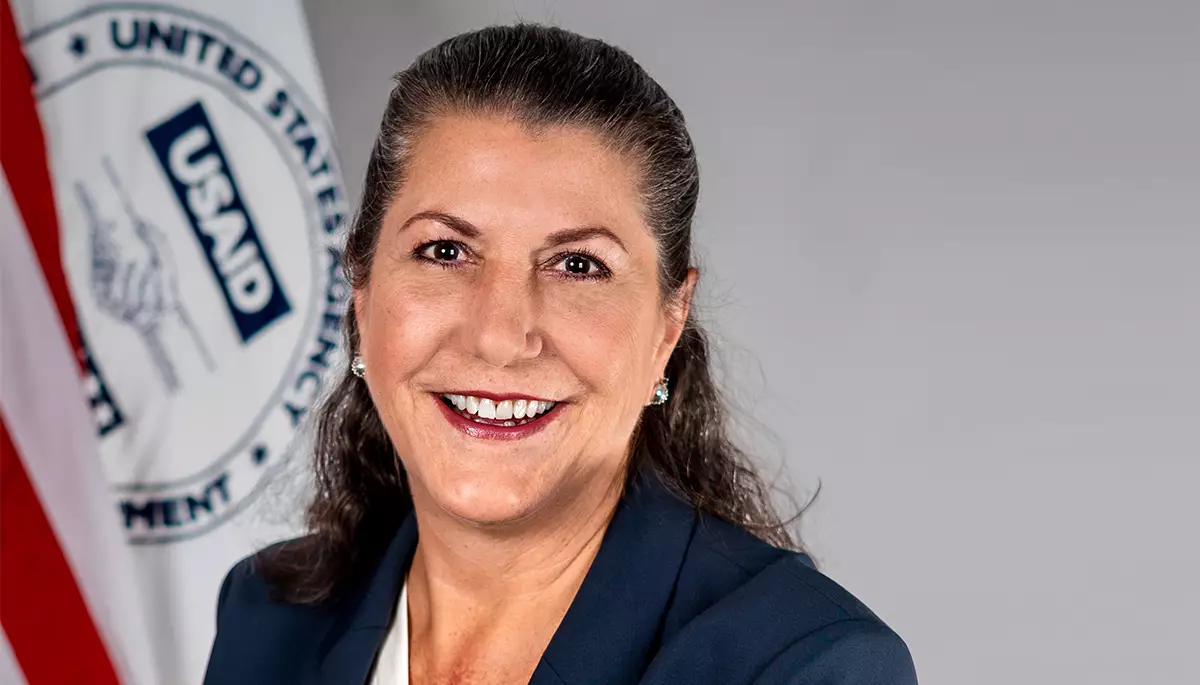

Українською текст читайте тут.
Many media rely on grants from international organizations that are providing support for the recovery of the Ukrainian media sector. Detector Media asked Erin Elizabeth McKee — who recently took over the Bureau for European and Eurasian Affairs at USAID — about the expectations this is raising and about USAID’s priorities and red lines for media support.
Prior to joining the Bureau for Europe and Eurasia, Assistant Administrator McKee served as the United States Ambassador to Papua New Guinea, the Solomon Islands, and the Republic of Vanuatu from 2019 to 2022. Before her ambassadorial appointment, she served as the Deputy Chief of Mission at the U.S. Embassy in Jakarta, was Mission Director for USAID/Indonesia and USAID/ASEAN, and in different positions within USAID in Washington, D.C., Central Asia, Iraq, South America (covering Peru, Bolivia, Colombia, Ecuador, Paraguay and Brazil), West Bank-Gaza, and Russia.
Our conversation took place during Erin McKee's meeting with Ukrainian journalists and media NGOs. Among other things, she talked about the decision to allocate $33 million to support the Ukrainian financial sector. And she ended this story with the following words: “I heard from all of you that the survival of independent media will be dependent on a thriving private sector to be able to generate ad revenue as well as broaden your constituents and toolkit. And I see while they may look far apart, all of our work is aligned to help support every element of Ukrainian economy and society to be able to realize a future that reaches, supports, and helps every Ukrainian.”
– USAID has Media Support Program in Ukraine for $75 million until 2025 (implemented by Internews. — DM). It is a huge amount, and it could be the biggest media support program in the world. But the problems for independent media in Ukraine during the war are huge as well. What if this amount is not enough, will you be able to dig deeper?
– That is a great question and a lot of that depends on Congress. It depends on impact, but it also depends on other partners and the private sector. The United States cannot support a sector or industry alone. We are there to not give a handout, but a leg up, as we say. It means that oftentimes we find that the investments we make in our programs are so clear and we can demonstrate the impact, the outcome, and the opportunity to bring even more donors, partners, funders to the table to close those gaps or bring that activity to scale on an even broader basis. So, what I can promise you is that if we are successful, then that success will drive and attract additional resources and partners.
– You are in D.C., and you know the context there much better than us. Will the support for Ukraine’s democracy and governance last after the upcoming elections this year and the presidential elections in two years?
– I do not have a crystal ball and I cannot say how the elections are going to turn out. But I am confident that regardless of which party comes into power, whether the midterms or the presidential election in 2024, the overwhelming bipartisan support and support on the part of the American people (which are frankly who the politicians must answer to) for Ukraine and for the Ukrainian people has been unlike anything I have seen in my entire life, in my entire career of public service. So, it is not dependent upon administration priorities. It is the partnership between the United States and Ukraine that will endure beyond any election cycle.
– Coming back to media support, what are your red lines? What are the measures, initiatives you think you should not support under any circumstances in Ukraine?
– That is an interesting question and one I cannot answer. I have to defer to our mission colleagues because those red lines depend on the sector, the context, and each country, right? Generally, there are no limits as long as the media and the partners we are supporting remain ethical, demonstrate great integrity, and continue to champion factual based reporting and access and ways to provide information even to those who do not have a smartphone — and being creative about ensuring that everybody receives the information that they need, sort of inclusive journalism, if such a thing exists.
And so, I would not say there is a red line. But there are partners who do not demonstrate those qualities and characteristics, who do not rise to the level of what we know is so important for the fourth pillar or the fourth estate, if you will, of democracy.
– If Ukrainian government came to you and asked for support for United News marathon or the state-owned TV channel, would you agree or not?
– I would have to see the exact nature of the request. We traditionally work through our partners and through programs as opposed to funding state bodies and state entities directly. The macroeconomic budget support that we have given recently is unprecedented in my agency's history (as of August 8, the U.S. government provided or made a commitment to provide $8.5 billion in direct budgetary support to the government of Ukraine. — DM). It is critical to keep the government of Ukraine governing so that they can continue to fight the war and pay pensions, pay medical bills, fund first responses, all the critical services that are fundamental to keeping Ukraine alive.
So, my supposition to you would be: unlikely, because we work primarily through our programs and partners outside of this one anomaly I described.
Photo: USAID, Detector Media